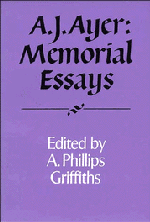Book contents
- Frontmatter
- Contents
- Preface
- A Defence of Empiricism
- Ayer: the Man, the Philosopher, the Teacher
- Ayer's Place in the History of Philosophy
- AYER'S ATTACK ON METAPHYSICS
- Ayer and World Views
- Language, Newspeak and Logic
- On the relation between Common Sense, Science and Metaphysics
- Logical Positivism and Intentionality
- Probability and the Evidence of our Senses
- Seeing Qualia and Positing the World
- Three Varieties of Knowledge
- The Importance of ‘If’
- Ayer's Ethical Theory: Emotivism or Subjectivism?
- Subjectivism and Toleration
- An Interview with A. J. Ayer
- Notes on Contributors
- References
- Index
On the relation between Common Sense, Science and Metaphysics
Published online by Cambridge University Press: 01 July 2010
- Frontmatter
- Contents
- Preface
- A Defence of Empiricism
- Ayer: the Man, the Philosopher, the Teacher
- Ayer's Place in the History of Philosophy
- AYER'S ATTACK ON METAPHYSICS
- Ayer and World Views
- Language, Newspeak and Logic
- On the relation between Common Sense, Science and Metaphysics
- Logical Positivism and Intentionality
- Probability and the Evidence of our Senses
- Seeing Qualia and Positing the World
- Three Varieties of Knowledge
- The Importance of ‘If’
- Ayer's Ethical Theory: Emotivism or Subjectivism?
- Subjectivism and Toleration
- An Interview with A. J. Ayer
- Notes on Contributors
- References
- Index
Summary
Among A. J. Ayer's many influential contributions to philosophy are the accounts of the nature of metaphysics which he propounded at various stages of his philosophical development. Whereas his early position is a clear version of the antimetaphysical attitude of the Viennese circle and, more generally, of logical positivism, his later position is, as he generously emphasized, in some crucial respects indebted to Peirce's pragmatism and to Ramsey's analysis of the structure of theories. His later views on the nature of metaphysics are contained in his book Central Questions of Philosophy and in his reply to my criticisms in a Festschrift, published on the occasion of his retirement from the Wykeham Chair of Philosophy at Oxford University (Macdonald, 1979). Although in this reply he describes his later account of metaphysics as ‘much too perfunctory’, it does constitute an important attempt at answering one of the central questions of philosophy.
The following essay has two main aims. One is to take a fresh look at Ayer's later view of metaphysics in the light of his reply to my criticisms, in particular at his thesis that metaphysical propositions are not assertive, but express policy-decisions the nature of which is best understood with the help of Peirce's distinction between facts and the arrangement of facts and Ramsey's distinction between primary and secondary systems. The other aim of the essay is to defend my own account of the nature of metaphysics and to exemplify its usefulness by exhibiting the relations between commonsense, science and metaphysics. Certain minor terminological differences between the present essay and its predecessor will–it is hoped–help to emphasize the empirical or, more precisely, the anthropological character of my approach.
- Type
- Chapter
- Information
- A. J. Ayer: Memorial Essays , pp. 89 - 104Publisher: Cambridge University PressPrint publication year: 1992

